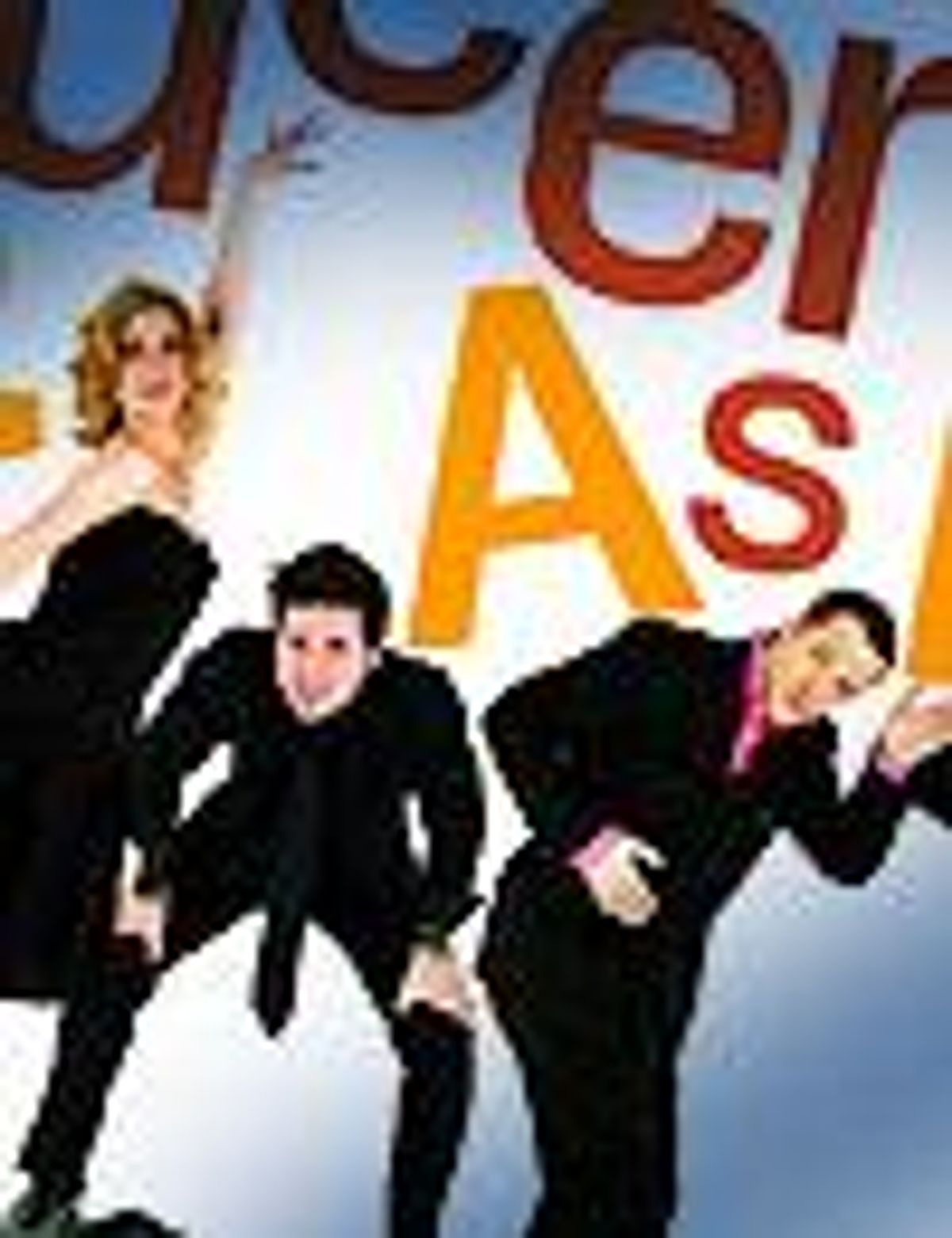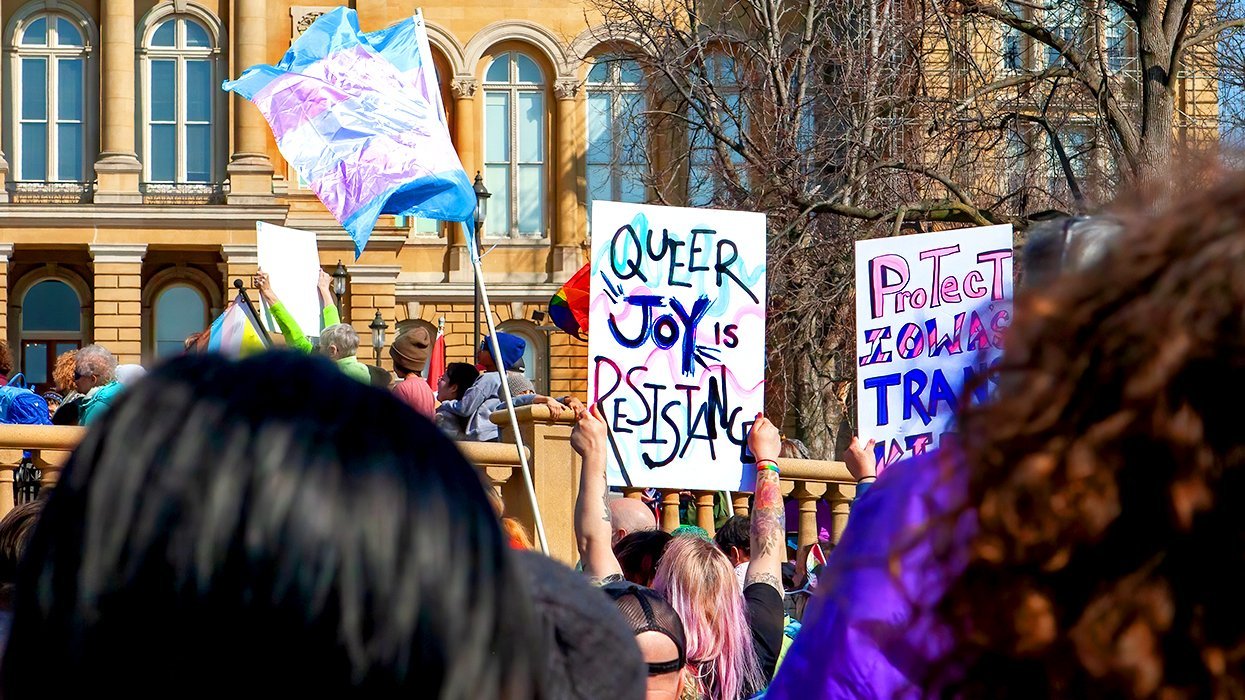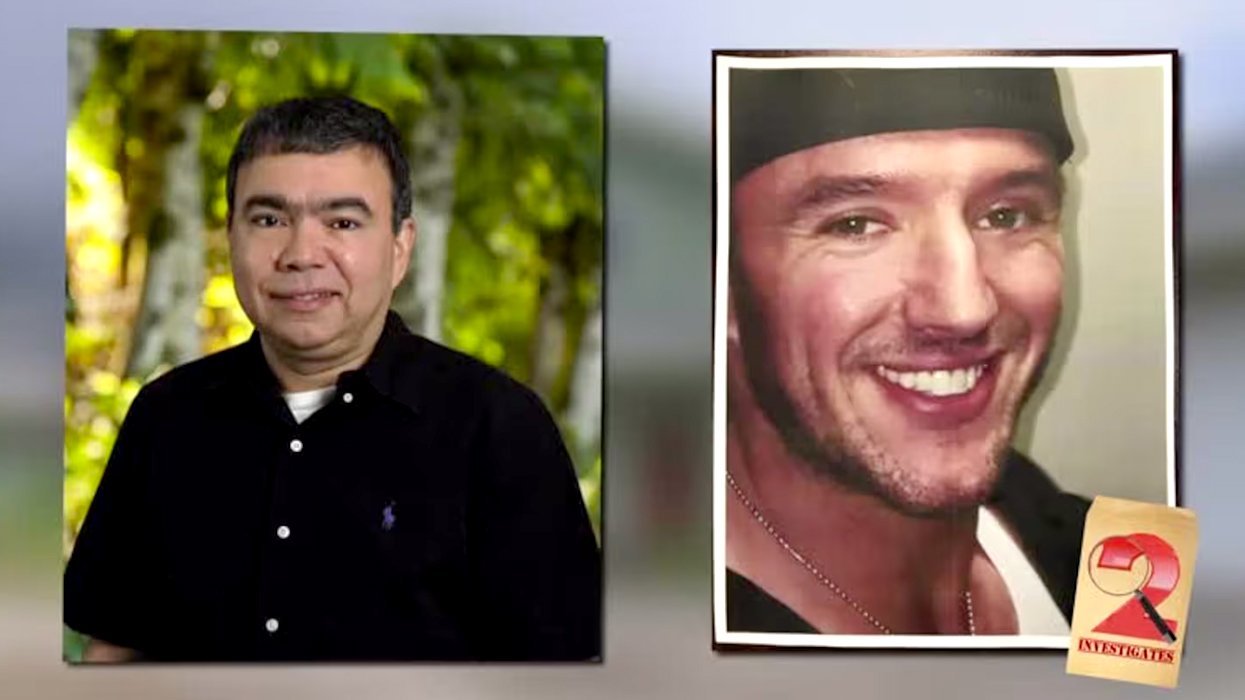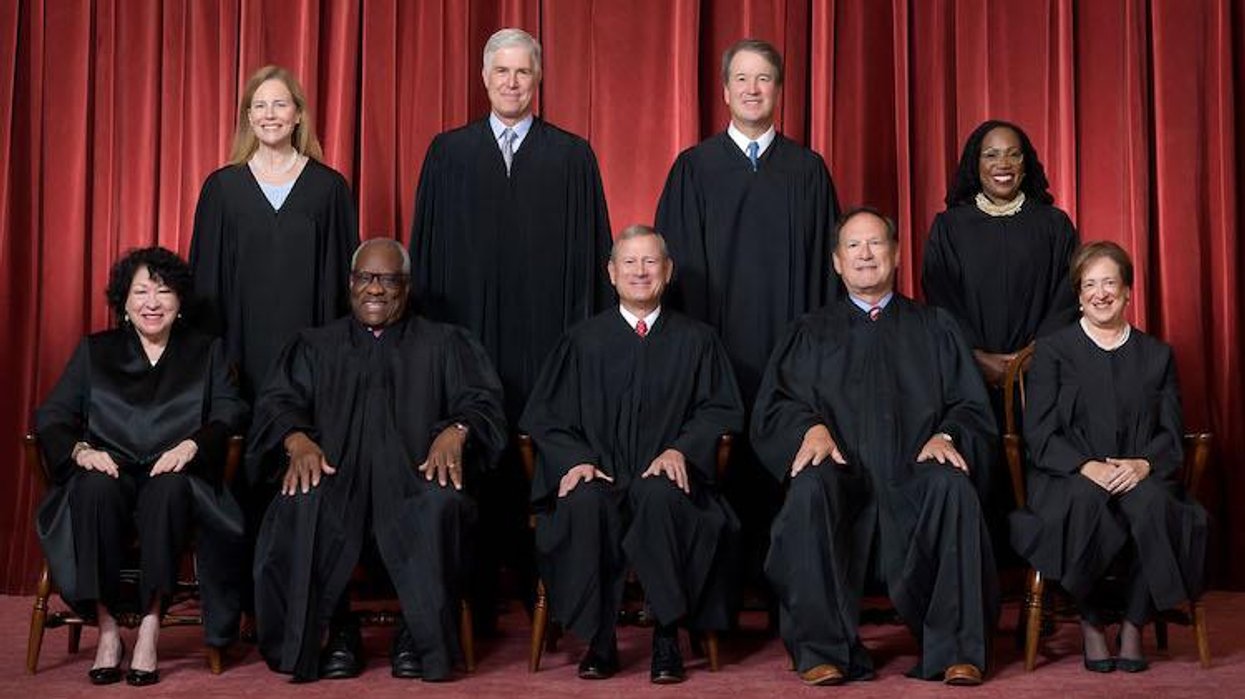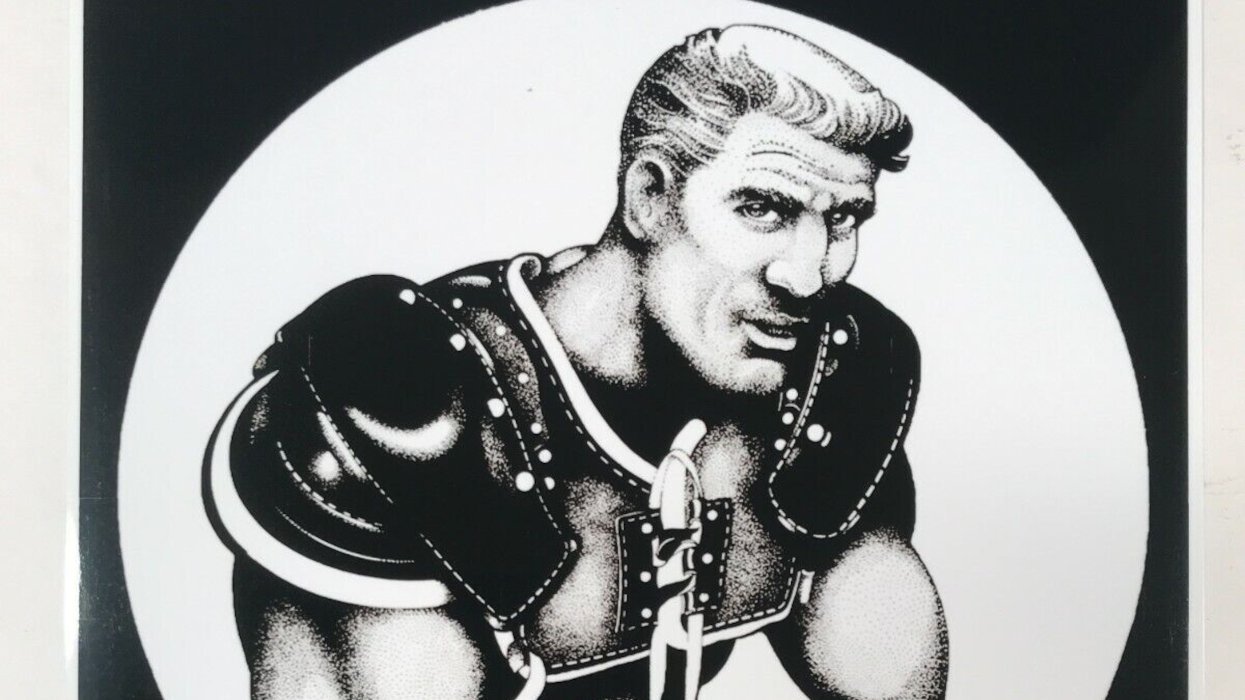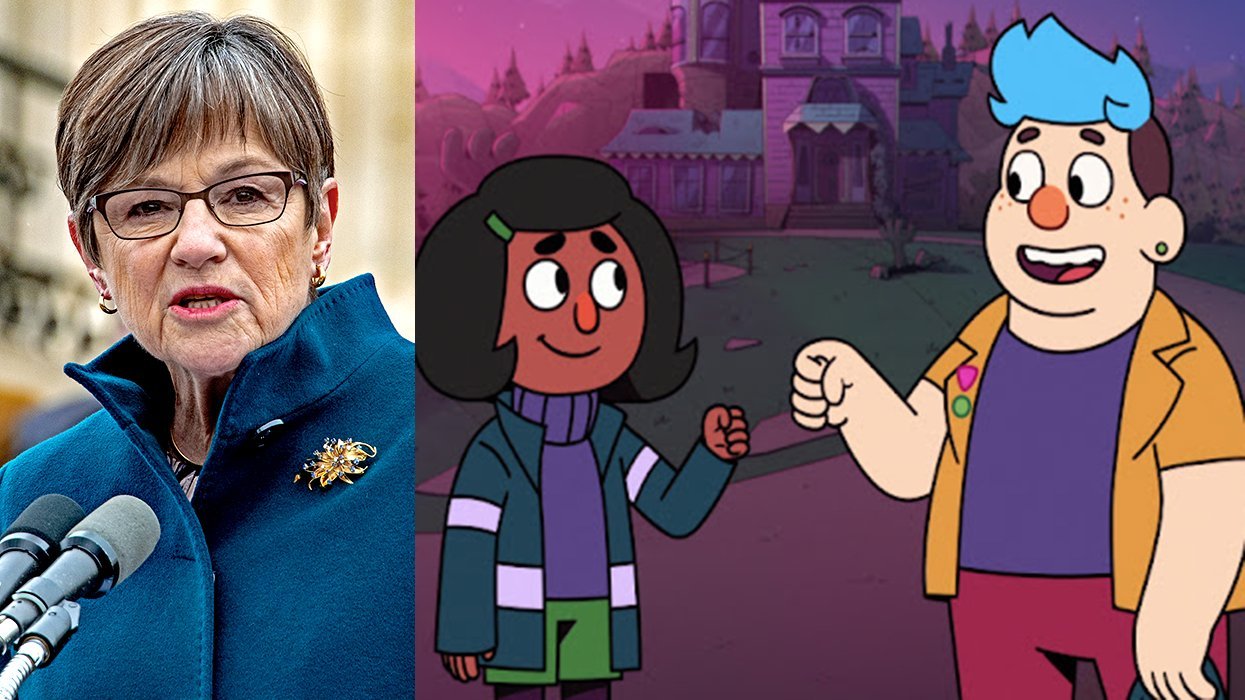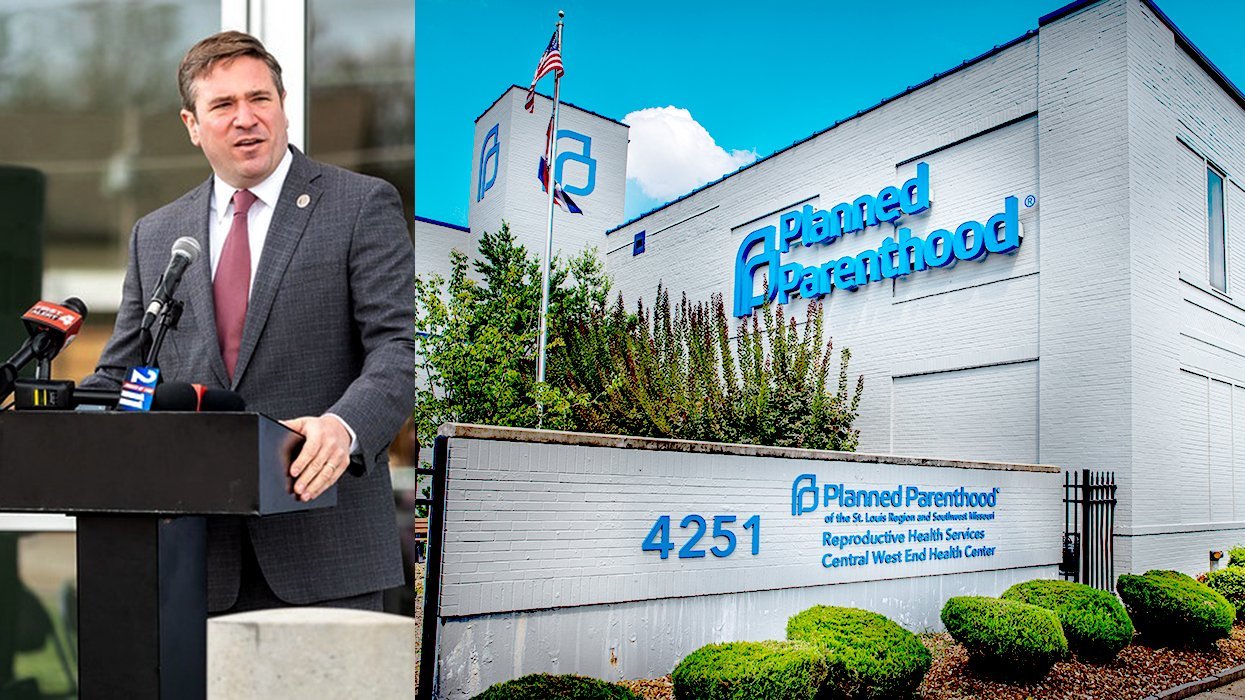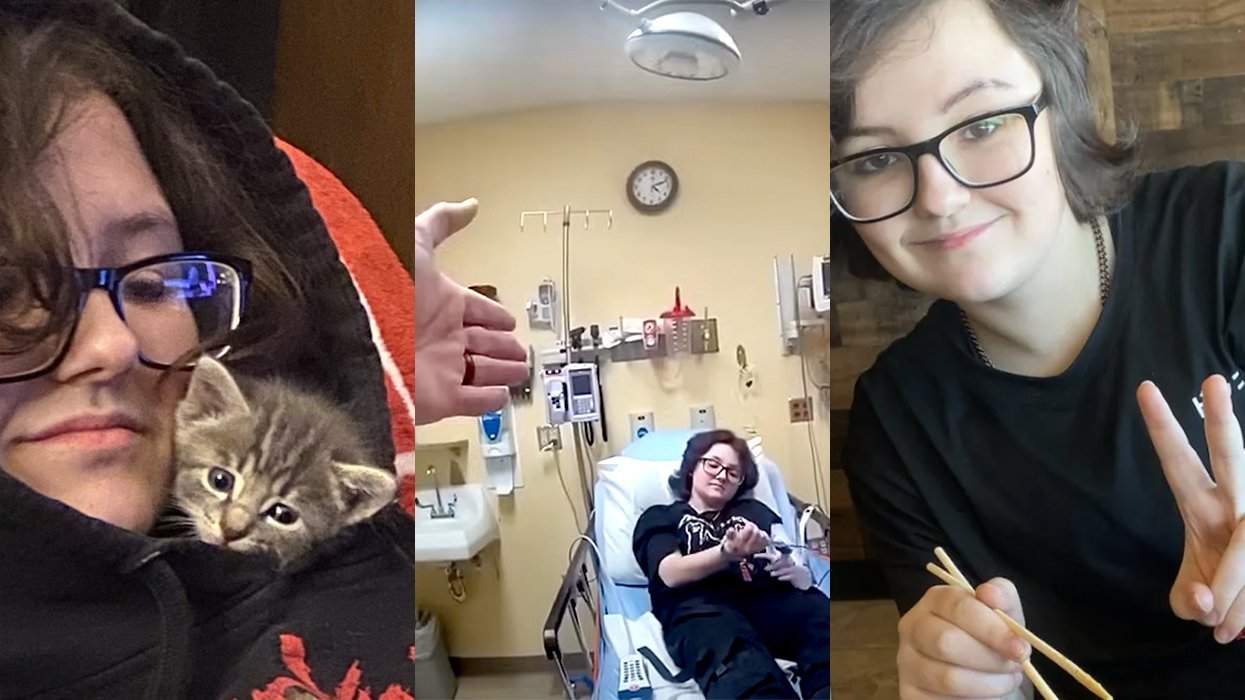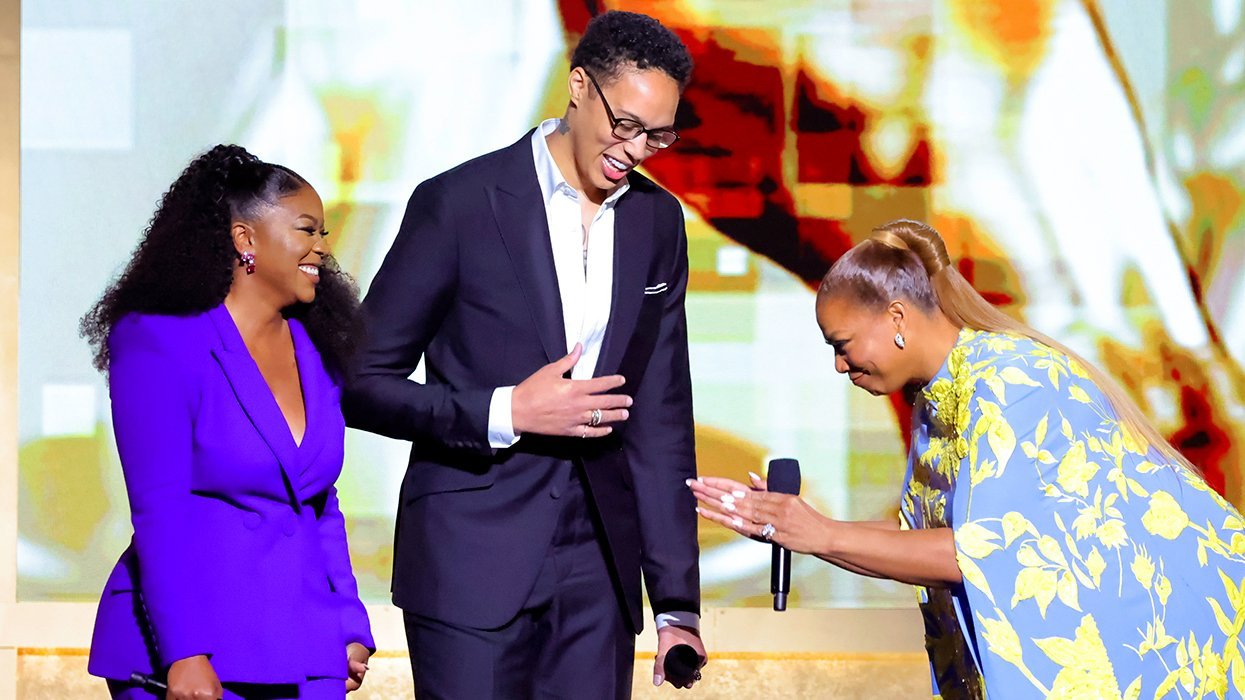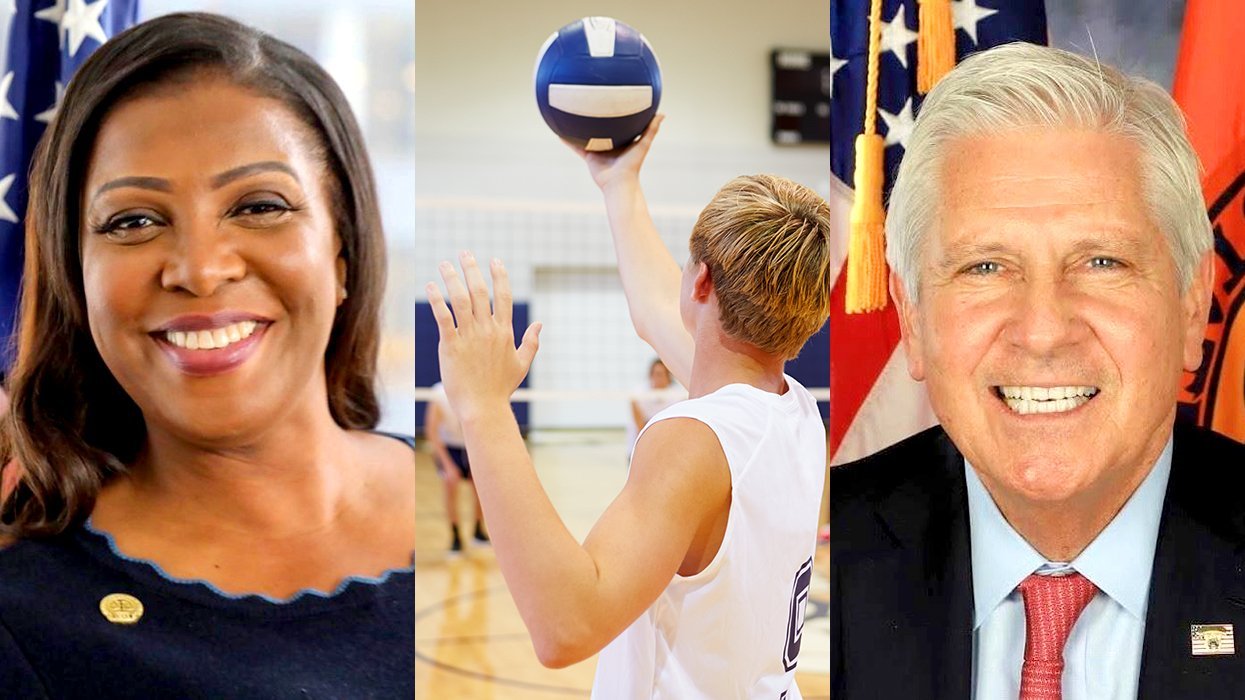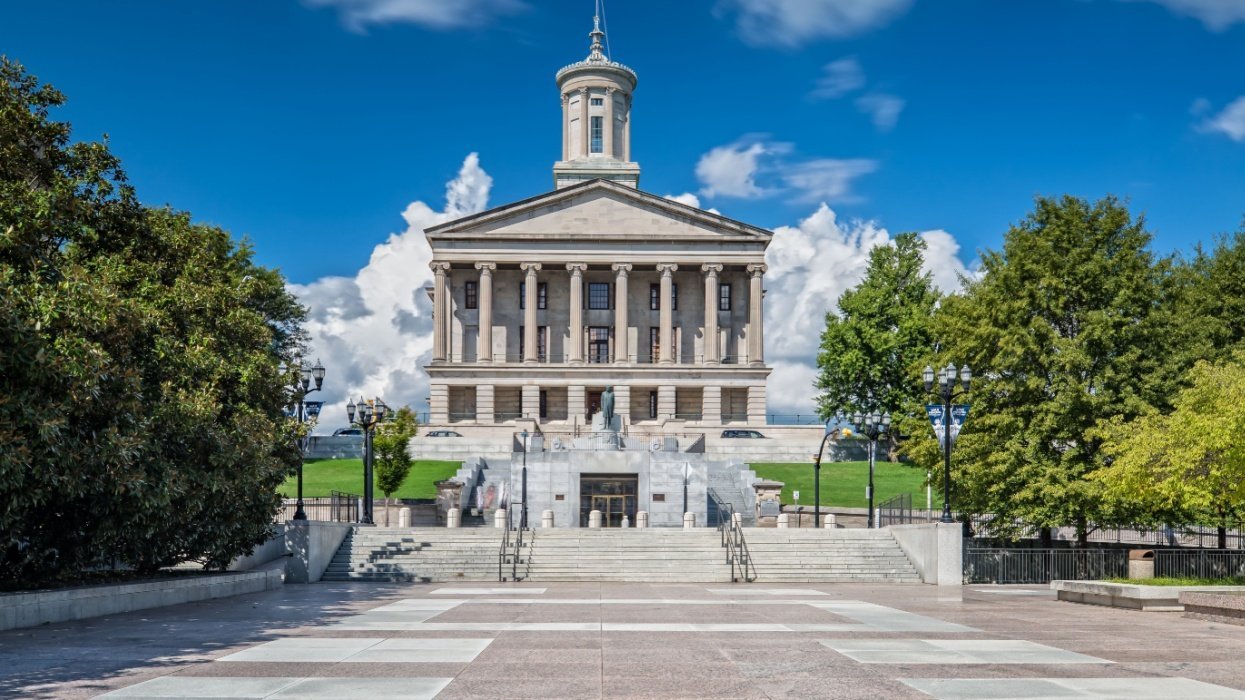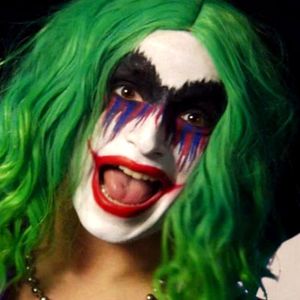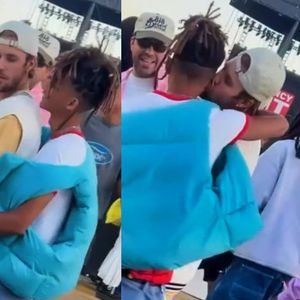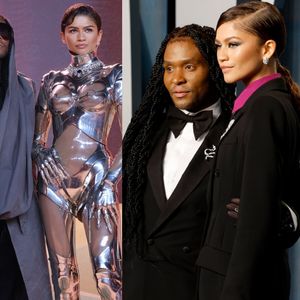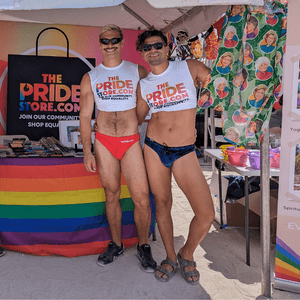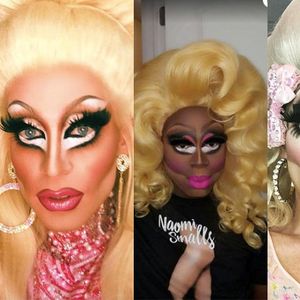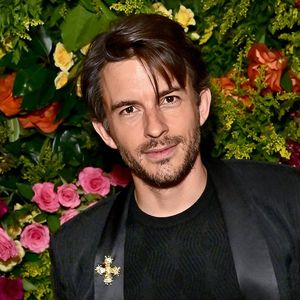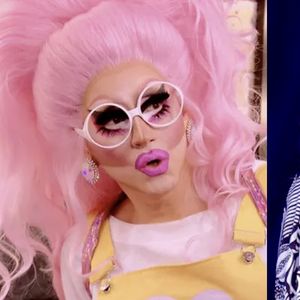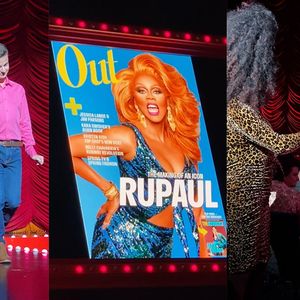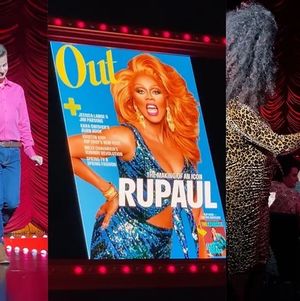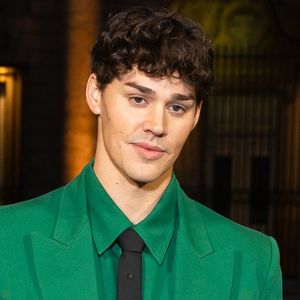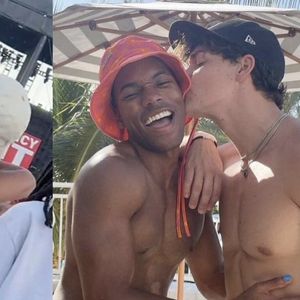Randy Harrison
1. What has been the biggest evolution in your
character's personality or life situation since
he first appeared?
Finishing puberty, losing his virginity, and leaving home.
2. If your character was a real person, would you be his
friend? Why or why not?
It's difficult for me to imagine Justin as a real
person. He's so thoroughly a character created
for serial television that his behavior, though
dramatically justified on Queer as Folk, would
register as childish, self-obsessed and absurd if it were
displaced into the reality I'm familiar with.
How could I be friends with someone who has nervous
breakdowns at spilled marinara sauce, assaults high
school enemies with small firearms, and has been
systematically and repeatedly betrayed, lied to,
condescended to, and humiliated by his boyfriend for
four years? Were I placed into the TV wonderland of
Queer as Folk, on the other hand, Justin and I
would fuck once, realize we were twins separated at
birth, and try to get our parents back together using
elaborately quirky schemes. I'd most like to tell
Justin to calm down. Maybe get him into a yoga class.
3. What's the one challenge or blessing you hope
your character faces in a future episode?
First off, I think Justin is old enough and financially
stable enough at this point to have his own apartment.
But, codependent as he is, I'm sure Justin
would get a large dog right away, probably a pit bull
named Harvey. Those would be two blessings. A challenge
Justin might face would be dealing with the
ramifications of having his cell phone stolen when he
went out at 4 o'clock one morning to innocently walk
Harvey and ended up giving a mugger a blow job in a public
park lavatory.
4. What single scene or episode so far has been the most
meaningful or memorable for you?
I'll always remember having to fake jack-off at
gunpoint, because it was so upsetting to me that I
didn't fake cum or even really fake 'get
it up,' so we had to reshoot it.
5. What have you learned about yourself by playing Justin?
What I've learned most while working on Queer
as Folk has come really indirectly, less from
playing Justin Taylor than from dealing with press,
corporations, advertisers, the gay community, and fans
of the show. I've learned the necessity of constantly
realigning your perspective and the importance of standing
up for yourself and being constantly aware that people
are going to skew and censor you in order to make the
idea of you better represent whatever agenda
they've decided you'll promote. And
it's all done so matter-of-factly, its such the
status quo, that it becomes very simple to accept even
though it completely corrodes the soul.
6. What do you think is the biggest issue facing American
gays and lesbians right now, and how well do you
think Queer as Folk has done in addressing
that issue?
I think the biggest issues facing Americans period, both
queer and not, are the environment, the economy, and
the war in Iraq. While I think Queer as Folk
has done a remarkable job addressing gay-specific
politics, most notably gay marriage, it seems to ignore the
fact that we are part of a global community of human
beings even before we are part of a local community of homosexuals.
7. Drawing from your contact with gay and lesbian fans
and the other gay people in your life, in what
ways do you think Queer as Folk has
influenced the gay community?
The most significant feedback I get tends to be from
queer teens, often closeted, who feel isolated in
various ways and have found that watching Queer as
Folk relieves some of that tension and loneliness.
I view the gay community as something so large, fluid and
diverse that it's impossible to make a statement like
"The show has affected this entire group in
this one specific way," but the letters I read
from individuals are things that I know have happened,
and they demonstrate to me the difference the show has made
in at least a handful of gay lives
8. In what ways do you think Queer as Folk has
influenced the portrayals of gays and lesbians on
other TV programs?
I really couldn't say. I'm going to
imagine not enough.
9. You've heard the complaints about the show from
some viewers and critics. What one complaint bugs
you the most and why?
I find it ridiculous when people talk about Queer as
Folk like it's supposed to carry some
enormous humanitarian agenda. It's a fucking TV
show! No one expects The O.C. to change the
world! It's strange to me that because the show is
predominately gay that characters and gay story lines are
held to a completely different standard. The medium in
itself is only capable of so much, and generally it
only aspires to a specific level of artistry and entertainment.
10. What's next for you? Where else can QAF
fans see your work in the future?
I'm doing a Broadway show. I might be done with
it by the time this comes out, I'm not sure.
Michelle Clunie
1. What has been the biggest evolution in your
character's personality or life situation
since she first appeared?
The biggest evolution in my character's life
since the beginning would be the decision she made to
carry her second child. Not only did this put her in a
more vulnerable position, but it also forced her to
rethink her priorities with regard to how hard she pushes
herself. She was forced to slow down, and slow is
not something Melanie understands.
2. If your character was a real person, would you be her
friend? Why or why not? What's the one
thing you would most like to say to Melanie?
If Melanie were a real person, we would most likely be
very good friends. I enjoy surrounding myself with
people who tell it like it is. She also has a very
true heart, which is rare to find. I have a very
eclectic group of friends, but the one thing they all have
in common is that they all have very big hearts. If
she were my friend, I would tell her to be more gentle
with herself.
3. What's the one challenge or blessing you hope
your character faces in a future episode?
I would love to see my character get a case that goes
all the way to the Supreme Court.
4. What single scene or episode so far has been the most
meaningful or memorable for you?
I still and always will love the scene from the first
season when we are in the hospital, and they
won't let Melanie go back with Linz and the
baby. It was raw and true and right.
5. What have you learned about yourself by playing Melanie?
I have learned through playing Melanie that people
respond more to strength than weakness. We all are
looking for heroes.
6. What do you think is the biggest issue facing American
gays and lesbians right now, and how well do you
think Queer as Folk has done in addressing
that issue?
I think equal rights is the biggest issue facing gays
and lesbians. We address this issue in almost every episode.
7. Drawing from your contact with gay and lesbian fans
and the other gay people in your life, in what
ways do you think Queer as Folk has
influenced the gay community?
Queer as Folk has had a very big impact on the
community. It has stirred up plenty of interesting
conversations between various demographics, by which I
mean people outside the community. Mothers and fathers
have come together with their children and have begun
to talk again and to understand them. It has forced
people to think and has encouraged talking and
opening up the channels of communication. It has made
room for other less intimidating gay programming to be
readily accepted. To create that sort of an impact one
cannot be timid or meek, but bold and in-your-face. Change
does not happen easily, it takes balls, and
that's what Queer as Folk has. Both
literally and figuratively: balls.
8. In what ways do you think Queer as Folk has
influenced the portrayals of gays and lesbians on
other TV programs?
Refer to number 7.
9. You've heard the complaints about the show from
some viewers and critics. What one complaint bugs
you the most and why?
Everyone is entitled to their opinions. It is still a
free country. Well, sort of. I am not interested
in doing bland, boring, conventional work or safe
work. Safe is not something that interests me.
10. What's next for you? Where else can QAF
fans see your work in the future?
I am currently shooting a film this summer titled,
"The Unseen."
Thea Gill1. What has been the biggest evolution in your
character's personality or life situation
since she first appeared?
I think the biggest evolution in Lindsay's life
has been the fact that she's been called upon
to work more. Lindsay has had to learn to balance her
family life with her work life. She has trouble with
this at times. Lindsay has grown stronger and much more
determined about fulfilling all her dreams in life as
a gay woman, but this has caused conflicted feelings
in her marriage with Melanie.
2. If your character was a real person, would you be her
friend? Why or why not? What's the one
thing you would most like to say to that person?
Yes. I would like Lindsay to be my friend. I'd
want to make sure I got to know her awhile before I
started pouring my heart out to her, but I would
eventually trust her as someone who, when push comes to
shove, owns up to her true feelings and weaknesses. Right
now, I'd want to say to her, "What the
hell's going on with you?!"
3. What's the one challenge or blessing you hope
your character faces in a future episode?
I would want Lindsay's blessing to be the freedom
to go back in time to the days when Melanie and
Lindsay first fell in love and live those memories
over and over again. A type of a "Run Lindsay Run
Back" episode!
4. What single scene or episode so far has been the most
meaningful or memorable for you?
I have to say the prom dance scene in the finale episode
of season 1 is one that is extremely memorable to me.
I was never a part of the filming of that scene, but
whenever I think about it and how it played out so
powerfully, I get goose bumps. Many people feel this way
about that scene, so goose bumps probably
aren't all that impressive. But I suppose what
makes that scene more meaningful to me is the fact that on
our final day of shooting, the last scene that was being
shot was the one in which Randy's character,
Justin, is being bashed in the head. Everyone in the
cast and crew were there and while we all witnessed the
scene being performed, there was such a silence that
pervaded the room that I'll never forget it. I
remember that silence when I think of that prom dance scene.
5. What have you learned about yourself by playing Lindsay?
I've learned to be in my body more. I've
learned to be more physically confident, to be proud
of my body, to express myself more with it. I
don't know why Lindsay has done this more to me than
any other character I've played. I suppose
it's because at times I have to show my body in
a sexually intimate way, which can sometimes be a
self-conscious thing, but also very liberating and
empowering. I feel the most empowered I've ever
felt, and I owe a lot of that to Lindsay, QAF,
and all the go-go dancers!
6. What do you think is the biggest issue facing American
gays and lesbians right now, and how well do you
think Queer as Folk has done in addressing
that issue?
I think the biggest issue facing American gays and
lesbians right now is the absolute recognition of gays
and lesbians to be equal members of contemporary
society with equal rights. I believe QAF has done
extremely well in addressing this issue by providing a group
of gay and lesbian characters in real life situations.
Based on the success of the show and the feedback
I've received, I feel QAF has helped mainstream
America develop a broader understanding of the gay community.
Peter Paige
1. What has been the biggest evolution in your
character's personality or life situation
since he first appeared?
God, that's hard to say. There was the whole
going straight thing, and the whole porn star thing,
and the whole Mrs. Millionaire thing, but I'm
going to have to stick with the relationship and
breakup with Teddy. Nothing has caused Emmett to risk
more, nor impacted him so deeply.
2. If your character was a real person, would you be his
friend? Why or why not? What's the one
thing you would most like to say to that person?
Are you kidding? I already feel like Emmett is my
friend. I've spent more time with him over the
last four years than all my previous boyfriends
combined. Not that I've minded. He's
smart, funny, open, kind--what else exactly would you want
in a friend?
3. What's the one challenge or blessing you hope
your character faces in a future episode?
I'd like to see Emmett address his family
issues. And buy a car. Seriously, how is this guy
getting around?
4. What single scene or episode so far has been the most
meaningful or memorable for you?
Do I have to pick one? There are several that
really stick with me. Emmett's HIV scare.
George's high-flying farewell, which is truly a
scene you will never see anywhere but on QAF, because
it goes from funny and naughty to full-on terrifying in .02
seconds. Asking Brian to help Ted and the Lana Turner
speech. And finally, confronting Ted about his addiction.
5. What have you learned about yourself by playing this character?
I've learned where I am open and where I hold my
shame. I've learned that being partially awake
is never good enough. I've learned that
kindness and truth are worth more than a million bucks
any day. I've learned that in order to love
someone else you have to love yourself first. And
I've learned that tangerine is not an easy
color to pull off.
6. What do you think is the biggest issue facing American
gays and lesbians right now, and how well do you
think Queer as Folk has done in addressing
that issue?
We are alive at an incredible moment in the history of
the world--complete civil rights lie just ahead; the
tide has turned, and it is only a matter of time
before we find ourselves first-class citizens of the
world. Imagine how wonderful it will be for the next
generation of gay youths, coming out and coming of age
in a world that denies them nothing, that demands for
them the same rights, same privileges, that everyone
else receives. But, as with every swing of the
pendulum, there will be backlash. We must remain
calm, true to ourselves, committed to our own
possibilities. No apologies, no regrets--only
quiet, steady, loving forward progress, until there is no
longer room to hate. And we have to get that bastard
out of the White House.
7. Drawing from your contact with gay and lesbian fans
and the other gay people in your life, in what
ways do you think Queer as Folk has influenced the
gay community?
I honestly think QAF has had less of an influence
on the gay community specifically than on the world at
large. Gay people already know these people and
these stories. And while I'm sure many of
us feel validated and represented for the first time by the
world's most powerful medium--television--it's
straight people who seem to be most powerfully
impacted by the show. I can't tell you the
number of straight men who casually slip into conversation
how much they love the show. What started as a freak
show for them has so normalized the idea of same-sex
relationships, whether it be emotional, physical, or
sexual, that the 'issue' has essentially disappeared.
8. In what ways do you think Queer as Folk has
influenced the portrayals of gays and lesbians on
other TV programs?
I'd like to think that it has increased the
media's willingness to portray gay people as
full, complicated, flawed, and sexualized
people. But to be honest, I still think there are a lot
of eunuchs and clowns out there.
9. You've heard the complaints about the show from
some viewers and critics. What one complaint bugs
you the most and why?
The whole 'It's only sex and drugs'
thing. It's not. Watch the show. Most
of the major characters are either in or recently came
out of a major relationship. Stop responding to
the hype.
10. What's next for you? Where else can QAF
fans see your work in the future?
I'm actually right now on the set of Donut
Hole, my feature directorial debut--a little movie
I wrote and star in opposite Kathy Najimy, Anthony
Clark, Melanie Lynskey, and Gabrielle Union.
Look for it next year.
Oh, and I also have a great role in the ensemble
comedy "Childstar," written and directed
by Don McKellar, which should be out late this year.
After that, you can find me in a mental institution,
where I'll be recovering from my nervous breakdown.
Ron Cowen and Dan Lipman
1. What has been the biggest evolution in the
characters' personalities or life
situations since they first appeared?
Oddly enough, we feel the biggest evolution has been on
the part of the audience. At first, they were startled
by the boldness of the show and the sexualized
characters. But eventually, many seem to have accepted
and even embraced it, investing themselves in the characters
as people--no matter what their sexual preference may be.
2. If these characters were real people, would you be
their friends? Why or why not? What's the
one thing you would most like to say to them?
First off, all the characters are real--to us. They
truly speak to us, tell us what words to put in their
mouths, dictate their behavior--as any good character
does. We love every one of them--warts and all. Just
as one accepts their closest and dearest friends.
3. What's the one challenge you hope the character
faces in a future episode?
The characters are challenged every season.
That's the nature of drama. Although we
haven't begun to formulate season 5,
we're certain they'll be challenged yet again.
And since the theme of the series is 'Boys
Becoming Men' or 'Girls Becoming
Women' for the lesbian characters, we'll also
see who becomes a man and who stays a boy.
4. What single scene or episode so far has been the most
meaningful or memorable for you?
We have our favorite moments: Brian showing up at
Justin's prom. That dance was so romantic--and
such a heartbreaking prelude to Justin's tragic
bashing. Ted's speech when Emmett joined
'See the Light' about God loving every one of
his creations, including every faggot. What we call
'The Covenant Creations' scene, where
Brian and Justin outline their very open relationship. Of
course, the very seminal scene in the pilot when Brian first
has sex with Justin, though Justin would call it
lovemaking. The very tender scene between Lindsay and
Brian in that same episode after Lindsay gives birth
to their son. And the rooftop scene between Michael and
Brian after learning of Brian's fatherhood.
Brian's father's funeral, with that
unexpected, gorgeous snowfall that everyone thought
was a planned special effect. Michael's 30th birthday
party where all the stories intertwined. If you want
more, we'll give you more.
5. What have you learned about yourselves from these characters?
These characters represent aspects of both of us. The
reality. The fantasy. What we wish we could be. What
we're glad we're not. They act out
behaviors for us. And suffer the consequences for us. In
fact, it's impossible to even imagine writing
characters, especially in a long-running series, that
don't reflect you personally.
6. What do you think is the biggest issue facing American
gays and lesbians right now, and how well do you
think Queer as Folk has done in addressing
that issue?
Gays and lesbians are now, more than at any other time
in our history, assimilating into the cultural
mainstream of maintaining gay culture. Like any
minority group, the challenge is not to lose your
identity, your individuality. We try to reflect this
tug-of-war on QAF. Michael and Ben, Melanie and
Lindsay are coupled. Raising children. On the outside
appearing very much like their
"straight" counterparts. Then there's
Brian, who doesn't believe in any of that. He
and Justin aren't straight. They're
queer. And queers live a queer life--which means not
playing according to the rules of heterosexual society.
There will probably always be this dichotomy in the
gay community.
7. Drawing from your contact with gay and lesbian fans
and the other gay people in your lives, in what
ways do you think Queer as Folk has
influenced the gay community?
We are constantly getting letters from younger gay
viewers telling us they've come out to their
family and friends due to the show. And we are
constantly getting letters from older gay viewers telling us
that they never thought they'd live long enough
to see a show like QAF and how much they wish
it existed in their youth. It would've made
such a difference in their lives. People either love
the show or hate it, but they can't deny that for one
moment at least, gay people have been put front and
center. That spotlight can be warm and inviting--yet,
also harsh at times. As one viewer wrote and told us:
"My entire life I thought of myself as a sideshow.
But now I'm the main attraction."
8. In what ways do you think Queer as Folk has
influenced the portrayals of gays and lesbians on
other TV programs?
QAF threw down the gauntlet and set a standard for
all portrayals of gay characters in its wake. Sure,
there were and will continue to be gay characters who
have no discernable sex life and who are just there
for laughs. But the fact that QAF exists makes that
kind of two-dimensional portrayal feel exactly like what it
is: incomplete. We hope that audiences in the future
will demand that gay characters be rendered as
realistically and completely as straight ones.
9. You've heard the complaints about the show from
some viewers and critics. What one complaint bugs
you the most and why?
People are very possessive of the show. That's
understandable. There aren't many shows like
QAF. Sure, there are shows with gay
characters--but none that have mostly gay characters in a
gay world. So, everyone wants to see themselves
portrayed on the screen. Of course, that isn't
possible. QAF is universal. We made a decision
early on never to judge our world. We try to cover every
aspect of the gay community. Our job is to tell the
truth. And the truth isn't always politically
correct. People want to see gay judges and gay brain
surgeons and monogamous relationships. All well and good. We
like that too. But that's not all gay people
either. We received an angry letter once that said,
"There's no room for sex, drugs, and
pornography in a show about the gay community."
Really. Well, certainly that's not what the gay
community is all about--but if you live on this
planet, you know those are certainly elements. Along
with marriage and having children and moving to the suburbs.
It's a rich, varied world. And we try to
incorporate it all. It still truly amazes us that the
sex on the show is criticized--mostly by the gay
community. But it's too late, folks. That
cat's out of the bag. Gay people have sex too.
And something tells us that it's not going to stop.
Scott Lowell
1. What has been the biggest evolution in your
character's personality or life situation
since he first appeared?
From nebbishy accountant to porn king to crystal meth
addict to singing waiter to nebbishy accountant. Hmmm.
2. If your character was a real person, would you be his
or her friend? Why or why not? What's the
one thing you would most like to say to that person?
I would absolutely be friends with Ted. He wears
his heart on his sleeve and is a very caring
friend. What Ted needs most to hear can't
come from his friends, though. It has to come from himself.
3. What's the one challenge or blessing you hope
your character faces in a future episode?
To learn to love himself. But not in the same way as
when he was a chronic masturbator. And then to find
someone to love. And to get a job running a bed and
breakfast in Hawaii.
4. What single scene or episode so far has been the most
meaningful or memorable for you?
The whole crystal meth story line was the most
rewarding. But the single scene and speech that I will
always remember is the 'God speech' that
Ted gives to Emmett back in season 1.
5. What have you learned about yourself by playing Ted?
That I've got nowhere near the level of
self-loathing that Ted does.
6. What do you think is the biggest issue facing American
gays and lesbians right now, and how well do you
think Queer as Folk has done in addressing
that issue?
Hands down the issue of gay marriage is the biggest
civil rights issue the country is facing. The
fact that religious beliefs are blinding people to the
civil issue at hand is infuriating to me. I think
our show does a good job showing both sides of the issue
from the gay perspective.
7. Drawing from your contact with gay and lesbian fans
and the other gay people in your life, in what
ways do you think Queer as Folk has
influenced the gay community?
I think QAF has helped the gay community feel
represented in a more realistic way than it ever has.
8. In what ways do you think Queer as Folk has
influenced the portrayals of gays and lesbians on
other TV programs?
I think it's raised the bar in terms of
portraying gay characters, as Ron Cowen and Dan Lipman
have already said, as only clowns or
eunuchs. Hopefully the community won't stand for
just that anymore. QAF was the first to
show gay characters as three-dimensional, flawed,
sexualized people.
